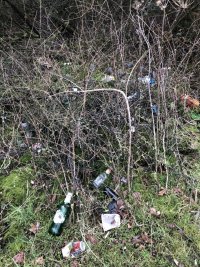Hi Paul,
So far a lot of what you have written can be turned around to read "we are okay with people trashing these areas on land, so let's allow them to trash new areas along waterways." That sort of argument is not helpful to the cause.
Everyone
I went away and did a little reading about this subject and I think it fair to say that the situation and aim of the petition has not been terribly well explained or represented here. You all may have been better informed about it to begin with, but further reading made the subject of more open access of waterways seem more reasonable. I had not realised how few rivers/waterways, have access, or how muddy the law is.
Admittedly, my reading has been brief, but there appear to be a number of areas of contention with different concerns and it wasn't clear to me how the petition would impact these.
Legal right to paddle across the water. The banks and bed can be private, but what about the water itself? I can see why fishermen, who may pay substantially to be on the river (esp trout and salmon fishermen) could be unhappy. I went down the Spey and encountered mixed reactions from salmon anglers, but mostly good, much better than the maggot drowners along the Thames in Oxford. Seems the main concern here is quantity. One party of canoeists going past in a day isn't a big deal. A steady stream of them throughout the day rather more so, especially if they stop to play. There isn't much that a fisherman, fishing, can do to mess up a canoeists day, other than be rude, obstructive or violent, but splashing about in a canoe can certainly put fish down for a time. There is also the quite reasonable concern that once people are on the water, they will get off the water and onto the land where they will cause damage or a mess.
Legal bank access to put in/take out. Even on waterways that have legal access for paddlers, it is often difficult to find places to put in and take out a boat, and in some cases these same access points can be occupied by maggot drowners who don't want to share. Understandably, landowners are suspicious of the public being granted more access points with visions of cars parked badly, blocked gates, liability insurance, loose dogs, litter, damaged fences or the expense of more gates. The walking public are often rude to farmers and don't stick to public footpaths, and once on land do not recognise that the right of access has limitations. Accessing for put in and take out, done right, shouldn't be a problem for land owners, but again its quantity and people acting responsibly. If a land owner has to put up with problems and get nothing for it, why should they be happy about it?
Easement along the banks, open access up to a distance from the river. This is how things are done in New Zealand, where there is free access up rivers and for X metres along the banks. There are also US Federal laws of a similar nature, but the US states and local areas often ignore them. This is probably the greatest concern. A petition asking for open access could be interpreted as wanting free access for 5m either side of the waterway. I don't know whether this is the intent or not, but it was how I read it when I first saw this thread. This is where the whole, people making a mess concern really comes in.
It would be useful for people who are canoeist to step in and describe how things work on rivers and lakes were there is already open or limited access. Would more access reduce the pressure on the resource by people becoming more spread out? Or, like junk expanding to fill available space, would more access simply see more people dropping litter and messing up places that have been preserved till now?


